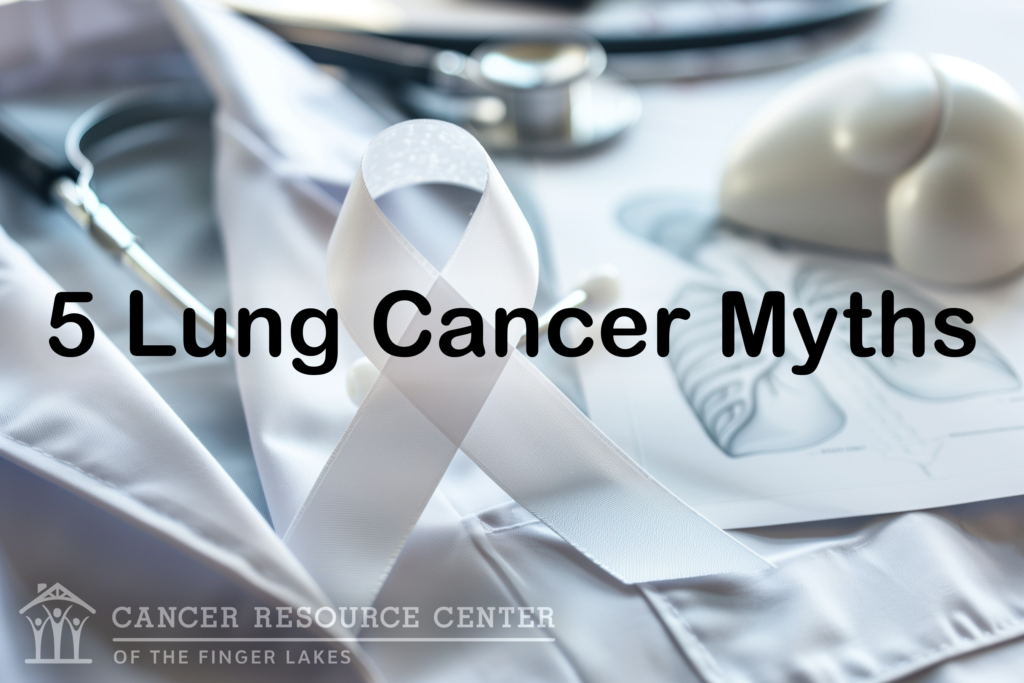Debunking Lung Cancer Myths Could Save Lives
If you’ve been diagnosed with lung cancer, you know all too well how many misperceptions surround this disease. Receiving the diagnosis is tragic enough without also being surrounded by harmful stigma.
Why are these myths so pervasive? It’s not this way for other cancers, such as breast, brain or pancreatic. It’s time to start debunking these ideas, so people with risk factors or symptoms can seek the care they need in a timely manner.
Lung cancer remains the leading cause of cancer death in the U.S. Challenging our inaccurate beliefs about this disease will help increase access to prevention, screening and treatment. Our misunderstandings about lung cancer are, in fact, deadly.

I’m going to break down 5 common myths about lung cancer, beginning with perhaps the most pervasive one:
Myth #1: You can only get lung cancer if you smoke.
This is untrue. According to the CDC, 10-20% of people with lung cancer have never smoked or used tobacco. This misconception can cause delays in screening and diagnosis for non-smokers.
While it’s true that the majority of lung cancer cases can be linked to smoking, other causes are radon gas, second-hand smoke, air pollution, asbestos and family history of lung cancer.
The fact is, if you have lungs, you can get lung cancer.
Myth #2: Lung cancer is self-inflicted.
Even in cases when lung cancer is linked to smoking history, blaming the victim is hurtful and counterproductive.
The decisions that we make every day, including ones that impact our health, are guided by many factors. These social determinants of health include the family we were born into, the resources that are available to us, the racism and discrimination we are exposed to, the geographic region we live in, and our access to education and employment. Simply put, we are not all starting from an even playing field.
Nicotine is at least as addictive as cocaine and heroin, and completely legal in all U.S. states. Smoking is still glamorized in pop culture and remains a growing addiction for young people.
When we judge someone for smoking, we have no idea what led them to that choice. Nicotine alters brain chemistry, making quitting very difficult. Removing the stigma about smoking would allow more people to seek out treatment for their addiction and thus lower their risk of lung cancer.
Myth #3: You can only get lung cancer if you are a heavy smoker.
The truth is that any amount of direct or indirect smoke creates a risk factor for lung cancer. According to the NIH, even those who smoke 5 cigarettes or less per day, have 3-5 times the risk of lung cancer compared to non-smokers.
While the risk is proportionate to the amount that we smoke, even a few cigarettes a day or exposure to second-hand smoke can increase that risk greatly.
Myth #4: There is no point in quitting smoking if you are diagnosed with lung cancer.
In actuality, quitting after a diagnosis has proven benefits. According to a 2021 study with 500 participants, the group that quit smoking lived a median of 22 months longer than the group that continued to smoke.
From a co-leader of this study, Mahdi Sheikh, M.D., Ph.D, “At the time of a cancer diagnosis, some patients might feel fatalistic and think there is no point in stopping smoking, but our research clearly shows that quitting smoking is very beneficial at any time and that it is never too late to stop smoking, even after a diagnosis of cancer.”
Myth #5: There is no way to screen for lung cancer.
Effective screening is available and recommended for high risk individuals. CT scans can find small tumors that have not yet spread or have not begun to cause symptoms. It’s important to point out that screening is NOT done when your doctor listens to your lungs with a stethoscope.
Screening for lung cancer is recommended for current or former smokers ages 50–80, with a history of smoking 1 pack a day for 20 years and for anyone who currently smokes or quit within the last 15 years.
Unfortunately, only 5% of qualifying individuals in the U.S. are being screened, which is the lowest of any cancer screening test. If you think you may qualify, talk with your doctor. According to the CDC, lung cancer killed nearly 132,000 Americans in 2022. We can prevent many of those deaths with earlier screening and treatment.
The more we talk about lung cancer in a factual way, the more we can break down the stigma. If you’re at higher risk, the first step is to start talking to someone who won’t judge you. This could be your doctor, a friend or family member, or a support group. If you know someone at a higher risk for lung cancer, you can be that safe person that they can turn to for good information and loving guidance.
No one deserves cancer. Everyone deserves care and support.
Sharon Berger, RN, IBCLC
Sharon Berger, RN, IBCLC, has worked in reproductive health care settings for over 20 years and is the owner of Our Milk House, a private lactation consulting practice. Her guiding principle is to meet people where they’re at, and is passionate about providing individual, compassionate and evidence-based care.
Sharon lives in upstate New York with her husband and their sweet old dog. Her other passions include making sourdough bread, gardening, hiking and visiting with her amazing adult children as often as possible.
References:
Centers for Disease Control and Prevention. U.S. Cancer Statistics Lung Cancer Stat Bite. U.S. Department of Health and Human Services. (2024, June 13). https://www.cdc.gov/united-states-cancer-statistics/publications/lung-cancer-stat- bite.html
Mathieson, A. Lung Cancer and Stigma. Canadian Cancer Society. (2020, March). https://cancer.ca/en/cancer-information/cancer-types/lung/supportive-care/lung- cancer-and-stigma
Raeke, M. 4 Lung Cancer Myths, Busted. The University of Texas MD Anderson Center. (2021, November 11). https://www.mdanderson.org/cancerwise/4-lung- cancer-myths–busted.h00-159465579.html
Schane, R, Glantz, S., Ling, P. Health Effects of Light and Intermittent Smoking: A Review. National Library of Medicine. (2010, April 6). https://pmc.ncbi.nlm.nih.gov/articles/PMC2865193/#:~:text=The%20risks%20for %20light%20smokers,)%20as%20nonsmokers%20(28).
The American Cancer Society medical and editorial content team. (2024, November 11). Why People Start Smoking and Why It’s Hard to Stop. American Cancer Society. https://www.cancer.org/cancer/risk-prevention/tobacco/why-people-start- using- tobacco.html
Winstead, E. Quitting Smoking Improves Survival in People with Lung Cancer. (2021, September 14). National Cancer Institute. https://www.cancer.gov/news- events/cancer-currents-blog/2021/lung-cancer-quitting-smoking-improves- survival







